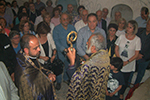Հարութ Սասունյանի սյունակը

L A TIMES INVITES SASSOUNIAN TO COUNTER TURKISH DENIAL OF THE ARMENIAN GENOCIDE
Three weeks ago, I wrote a column criticizing the editors of The Los Angeles Times for providing a worldwide platform for Turkish denials of the Armenian Genocide by posting on the newspaper's website the transcript of their meeting with leaders of the Assembly of Turkish American Associations (ATAA).In response to my column, the executives of The Times invited me last week to meet with editors Tim Cavanaugh and Paul Thornton. After the meeting, The Times published the following note on the editorial page in its April 24, 2008 issue: "Harut Sassounian visits the editorial board to discuss genocide denial, changing governments, historical records and more." Highlights of the editorial board meeting were posted on The Times website which can be accessed by clicking on the following link: www.latimes.com/primarysource. Portions of that interview are reprinted below:
The Armenian question, 2008
Harut Sassounian on realpolitik and genocide
Harut Sassounian, publisher of the California Courier and a leading figure in the local Armenian-American community, visited the Times this week to discuss relations with Turkey, genocide recognition and other matters. Here are some highlights.
Giving a forum to the ATAA
Tim Cavanaugh: The Times recently put up a transcript of our meeting with the Assembly of Turkish American Associations. You've indicated that that's comparable to giving, say, skinheads a platform to deny the Holocaust. Could you expand on that?
Harut Sassounian: I fully respect freedom of expression -- after all, I'm the publisher of the California Courier, so I understand the mission and purpose of journalists and editors. However, I took offense, and a lot of the people who contacted me were offended, that this group could come in and not only have a meeting -- which is not a problem -- but then have their words of denial put on the world wide web. Even with the best intentions of educating and informing the community about their position, the L.A. Times is becoming an indirect conduit for denial of genocide, which is very offensive to us.
Cavanaugh: Clearly anything I say on this is going to sound defensive, but I would say there's news value in hearing these people state their position. This is not a fringe group; it's a well-established organization.
Sassounian: Any group, no matter who they are, that denies any genocide or holocaust, I can not with a clear conscience call them a respectable group. They lose respectability when they deny genocide.
Talking Turkey
Sassounian: I avoid interfacing with Turkish officials, because they're bound by their positions to propagate the official Turkish line of denial. So there's no point in having any communication with an official who can't say anything other than the government's position. I've had many offers to meet with Turkish consuls or ambassadors, but I turn down all invitations because they know what I'm going to say and I know what they're going to say, so there's no point in offending each other.
Paul Thornton: But they would say they're inviting you to join them in some kind of fact-finding mission that will determine the final say in this = -- even though historians agree.?
Sassounian: I'm not the one who needs fact-finding. I welcome and encourage Turkish officials, scholars and journalists to do all the fact-finding they need. If they have questions, I'll be happy to answer questions or direct them to sources. But I don't need to find out what happened. I know what happened. My grandparents' families on both sides were wiped out. So that's not something I read in a book. I grew up with my grandfather and grandmother telling me the hell they went through. It would be besmirching their good name to join in some kind of fact finding.
Widespread recognition of the Armenian genocide
Cavanaugh: My anecdotal impression is that there's pretty wide acceptance of the reality of the Armenian genocide: popularly in the United States, and maybe worldwide. I mean, a substantial number of people in the world don't even know the Holocaust happened, so you're never going to have total awareness, but there does seem to be pretty wide recognition.
Sassounian: That is a very correct impression. Scores of countries, parliaments, have passed resolutions recognizing it as genocide. The U.S. Congress itself, all the way back in 1916. There was a Senate resolution in 1920; more recently in 1975 the House passed a resolution recognizing the genocide. In 1984 there was a second resolution. President Reagan in 1981 signed a presidential proclamation saying "genocide." The UN Sub-commission on Human Rights did a study and concluded it was genocide. The European Parliament in 1987 passed a resolution. And many others have since then. So at this point it's no longer what we used to call the forgotten genocide or the hidden Holocaust.
Cavanaugh: So what are you campaigning for now? I mean there was this thing last year where Cong. Jane Harman disappointed a lot of people locally. What would we be looking for now in terms of recognition?
Sassounian: Let's dispose of Jane Harman before we get on to more serious issues. Jane Harman's mistake was that she was a co-sponsor of the genocide resolution; while remaining on record as the co-sponsor, she wrote a letter to the chairman of the House Foreign Affairs Committee asking that the resolution not be brought up for a vote. So she was saying one thing openly and doing something else behind the scenes. That's double-talk and dishonest in my book.
Coming back to the more serious issue, for several decades after 1915, parts of various families survived the genocide. So initially, they found themselves in the deserts of Syria, no housing, no food, nothing -- completely in destitute shape. So what was on their mind was getting a mud hut to live in and a piece of bread to eat. Over time, they built churches, schools, a semblance of normal life. Then people of the next generation started forming groups dedicated to recognizing the injustice that was done to them. They would write letters to government officials, which would get ignored.
When my generation came along, we were the first to get educated, know foreign languages, understand the ways of politics. It was this generation that began to get some recognition of the genocide. Little by little, as things began to change, the Turkish government started to react, started saying there's no such thing, just ridiculed it. But as the world began to accept this, the Turkish government started putting serious money and effort behind the denial. So they brought in Turkish and non-Turkish scholars, hired lobbying firms.
But now the genocide is an established fact. So we're not clamoring anymore about the world ignoring us. And the L.A. Times is the best example of that. The paper is on record recognizing the genocide. So are the New York Times and the Boston Globe. Even recently, Time magazine issued a statement recognizing it as genocide and saying it would be referred to as such.
In 1915, there was a nation living on its own ancestral homeland. They had been there long before there was a Turkey. In addition to losing 1.5 million people, we were uprooted from our homeland. So what Armenians would like -- and this is not a dream that can be realized anytime in the near future -- is justice. Everything was taken from them: their lands, churches, bank accounts, livestock, homes, everything. This was a gross injustice done to these people. Just asking for recognition from the Turks, having them come and say "Yes, 90 or 100 years ago, your ancestors were wiped out," that doesn't do anything. We already know we were wiped out.
So what we want, as a right -- no matter how impossible its implementation -- is justice for the Armenian people. For all the stuff that was taken from them we demand just compensation. And that can take many forms. This is where Armenians and Turks should sit down, and have a very lengthy and serious discussion about what can be done, what's realistic and what's not, what form it should take, whether it's realistic to demand land at this point, whether it's realistic to make financial compensation, as Germany did with survivors of the Holocaust... At least at the surface level, Armenian churches, religious monuments in Turkey , should be returned to the Armenian Patriarchate in Turkey . Not to the United States or Armenia or some foreign entity, but to the few survivors who live in Turkey still. These are citizens of Turkey and these are their houses of worship. And they have the right, under the Treaty of Lausanne, to worship there.?
Court cases
Thornton: What's preventing a case from being brought to the international court right now?
Sassounian: Nothing's really preventing anyone. There are several practical issues. One is that Armenians for many decades were trying to recover and establish the facts of the genocide, so they weren't running to court. In recent years, lawyers filed against New York Life, and got a $20 million settlement for Armenians who had life insurance policies. Now there are lawsuits against several German banks to recover funds that Armenians deposited before the genocide. There was also a large amount of money deposited in the Ottoman Bank. So at some point, Armenians are going to go for their possessions, and go to European courts with their deeds of trust and demand that they get their possessions back.
The second answer is that the world court can only take cases brought by governments. For many years there was no Armenian nation. So now we have the Republic of Armenia, which is in desperate straits, so they're not going to go and antagonize Turkey, which is a much stronger neighbor. And the Diaspora has no standing in that court.
This is not about wishful thinking. You have to go to international experts and find out, for example, does a court now, in 2008, deal with an event that took place 93 years ago? You have to look at questions regarding the Genocide Convention of 1948, whether that has any retroactive effect. Those are very complex legal issues. It's not a matter of civilians saying "I want this or that." Because the worst thing that can happen to Armenians is, if they're not skilled in legal issues, if they just go and file in court and the court dismisses the case because it has no jurisdiction, then the next day the Turkish propaganda machine will say, "The Armenians tried to file a genocide claim but it was dismissed because it had no merit."
Realpolitik axis
Cavanaugh: One of the things that really seems to make it tough for these kinds of discussions is this axis in Washington D.C. of realpolitik types who take the line that we can't do anything to infuriate Turkey , that we need to have them on board, they're important to Israel, and so forth. What presence do Armenians maintain in D.C.?
Sassounian: We have a couple of small Armenian organizations with small staffs, who try to defend Armenian interests and counter the Turkish efforts.
But as for realpolitik, I studied international affairs and I was a U.N. delegate for ten years, so I know the reality of the world. And I know many of the things we say run counter to realpolitik. But let's stay at the level of realpolitik for a moment, and not get into issues of justice or truth. If U.S. and Israeli officials, from day one, or even now, would say to the Turkish republic: "We are allies, we share common interests, we wouldn't want to do anything to hurt you. But this is something that was done more than 90 years ago, by a former regime that no longer exists. We cannot, because of friendship, go against the truth. This is history. We're not talking about taking action, of grabbing a chunk of Turkey and giving it to Armenia. We have no ill will against Turkey. But we cannot change history. This thing happened in 1915. We will continue to be friends."
Think of it this way: Say a new administration came up in Germany and said, "We are deeply offended by the constant reminders of the Holocaust, and if the United States ever again brings up the Holocaust, we're going to walk out of NATO, send your ambassador back, cut off trade, etc. We're going to do that unless you shut down the Holocaust Museum in Washington." What would the U.S. government do? It would say, "I'm sorry. We're going to continue to recognize the facts and we're not going to be bullied by anybody, especially a country that is much less powerful than the United States." And Germany's much more powerful than Turkey.
This is what they should have done with Turkey . But instead, to the detriment of U.S. interests, they are always trying to appease, trying to say "Yes, it was a tragedy but it was not genocide. We can't pass this resolution." If you are always trying to appease, and saying you're sorry whenever Turkey gets offended, once they see that you're being soft and weak and not determined, then they start being demanding. That's why last year when the resolution came up, Turkey threatened to block delivery of military hardware going through Turkey to Iraq . Now they've got you. Now you've allowed yourself to be manipulated by a regime that's not only denying history, but threatening your interests.
Instead, you should show you are resolute. In 1981, when President Reagan signed that proclamation, the Turkish government complained, and there were negative articles in the Turkish press. Three days later, it was completely forgotten. That's the position the U.S. government should take. Many other countries have taken that position, and for a while Turkey was mad at them, but they don't take the position that when this or that country recognizes the Armenian genocide they punish them for it. So, if you want realpolitik, just bite the bullet and get it over with.
Changing governments
Cavanaugh: Do you see different attitudes from the Turkish government, on this or any other issues, since the Islamist party has been in power?
Sassounian: I think the government in power now is much more people-oriented, sympathetic in general to all sorts of minority rights and human rights. That doesn't mean they're pro-Armenian by a long shot. But that's a government that eventually could lead to positive developments between Armenians and Turkey.
However, on the negative side, that government is under tremendous internal pressure from the Turkish equivalent of neocons. The radical, nationalist, and kemalist Turks are putting so much pressure on Erdogan's government that Erdogan is not in a position to take positive steps on this issue.
However, since the new government has come into power in Armenia, there has been an exchange of letters between Turkey and Armenia, saying they're interested in establishing normal relations. So there are early indications that possibly with new officials, this could lead to something positive.
By Harut Sassounian
Publisher, The California Courier




















